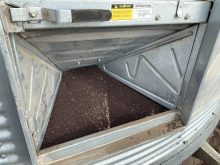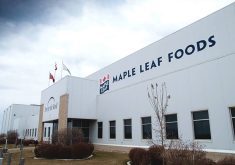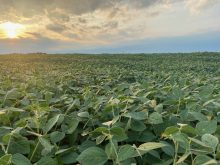Farmers who are worried about chemical and seed giants Bayer and Monsanto merging should be, according to one prominent agriculture economist.
With 94 per cent of western Canadian canola containing Bayer’s Liberty Link or Monsanto’s Roundup Ready traits, the new company will have tremendous market power resulting in higher canola seed prices for farmers, said Richard Gray of the University of Saskatchewan, in an interview Sept. 15.
“I think there are implications for pricing… and the overall benefits to society and producer benefits,” Gray said. “You really do have a reduced incentive to innovate because if you have (almost) 100 per cent of market share you are not trying to beat your competitor. You are the competitor.”
Read Also

Manitoba sclerotinia picture mixed for 2025
Variations in weather and crop development in this year’s Manitoba canola fields make blanket sclerotinia outlooks hard to pin down
The Canadian Canola Growers Association doesn’t oppose the merger so long as Canada’s Competition Bureau ensures competition isn’t reduced, association chief executive officer Rick White said in an interview.
Bayer and Monsanto account for about 70 per cent of Canadian canola seed sales, he said.
“I would call it monopolistic power,” White said. “There is no question that when you start getting up to 95 per cent (control of traits), or even 70 per cent control (of seed sales) that’s way too high. That would be a monopolistic situation that we have to avoid. That is our concern and that is going to be our discussion if we get to talk to the Competition Bureau.”
Keystone Agricultural Producers’ (KAP) president Dan Mazier is worried, but isn’t sure much can be done.
“I would really love the opportunity to sit down with Bayer and Monsanto — Monsanto has offered already,” he said in an interview.
“The merger is going to happen no matter how much bellyaching we do. It is just a fact of life. These mergers are going to happen. Should there be some regulations? This being an international company I don’t know how much we can actually do here in Canada. It might open up some opportunities for other companies to step in and bring in some other technologies.”
Gray expects Canadian regulators to force the companies to divest some assets.
“My guess is that they will sell the Roundup Ready trait to somebody else,” he said.
“It does mean that they will have to give up some market power, but that is the whole point of the regulation.”
Bayer said it needed approval from antitrust authorities in 30 jurisdictions, but its initial feedback from both regulators and politicians was encouraging.
The Canola Council of Canada doesn’t comment on members’ commercial decisions, a council official said in an email.
“As discussions progress, we look forward to learning more about how the proposed merger will affect canola innovation in Canada.”
The $66-billion purchase of U.S.-based Monsanto, the world’s largest seed company, by German-based Bayer, a pharmaceutical firm and the world’s second-biggest chemical company behind Syngenta, was announced Sept. 14 after months of negotiations.
In 2013 Monsanto and Bayer controlled 26 and three per cent of global commercial seed markets, respectively, the Canadian Biotechnology Action Network (CBAN), which opposes genetically modified crops, said in a release.
It said Monsanto and Bayer controlled eight and eighteen per cent of global farm pesticide markets.
Bayer and Monsanto are two of six firms that control 63 per cent of the global commercial seed market and 75 per cent of the pesticides market, the CBAN release said.
In addition to this merger, Dow and DuPont-Pioneer have agreed to merge and Chinese government-owned ChemChina is buying Syngenta. If they go through the resulting three firms will control almost 61 and 65 per cent of global commercial seed and pesticide sales, according to CBAN.
Bayer and Monsanto officials say the merger is good for farmers.
“The combined business will be ideally suited to cater to the requirements of farmers… because we have equal and meaningful strength in both crop protection, seeds and traits, and digital and analytical tools,” Bayer CEO Werner Baumann said on a call with analysts.
Monsanto chief executive Hugh Grant said the merger will result in “an innovation engine that pairs Bayer’s crop protection portfolio with our world-class seeds and traits and digital agriculture tools to help growers overcome the obstacles of tomorrow,” Ag Insider reported.
There could be innovations benefiting farmers long term, but without regulatory mitigation “in the meantime I think it would be pretty awful for seed prices,” said University of Manitoba agricultural economist Derek Brewin.
Brewin believes the merger will discourage innovation.
So does White.
“Bayer and Monsanto trip over each other trying to outinvest each other to come up with the next new innovation to gain market share over the other,” he said. “If you have a monopoly all of a sudden that competitive drive is lost and that could have a substantial lessening of innovation in the future… (and) you can just raise prices and keep a lock on the market and not have to spend so much on R&D anymore.”
Research conducted by Brewin and University of Lethbridge agricultural economist Stavroula Malla found just that. When Roundup Ready canola was first introduced to Canada in 1996, the benefit to farmers was a wash due to higher seed costs. That changed around 2002 when Bayer introduced Liberty Link canola, Brewin said.
The study shows new canolas from competing companies earn western Canadian farmers about $700 million a year through reduced herbicide costs and higher yields.
“This is way, way more important than fertilizer (consolidation) because we know the high rates of return (from variety development) and we know future economic growth depends on a really viable crop research sector,” Gray said. “In particular seed genetics are very important for the future of the country and for food security in the world and monopolizing is not a good idea. It is just such a critical issue for the future of the grain economy.”
When farmers get off their combines Gray expects they’ll push the Competition Bureau to preserve competition.
“This is something producers are going to have to figure out,” he said. “Some say this is good and big science is good, but canola seed sales in Western Canada are easily $1 billion (a year)… and they (companies) are investing about $100 million… into seed development. And those ratios are going to get uglier (if Bayer and Monsanto are allowed to merge without conditions).”
(With files from Reuters)




















